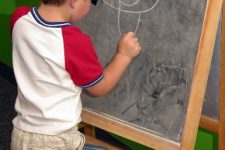Developing Critical Thinking in Students

February 18, 2012 by PLB · 3 Comments
It is important to develop critical thinking in students. This skill set will help them deal with everyday situations with greater ease and responsibility.
There are many strategies that can be used to make students think
critically. Some of them are:
Classroom Assessment Techniques
In this technique, you let the student assess the lessons on an ongoing basis. […]
Behavior Intervention Strategies: Classroom Layout

February 16, 2012 by PLB · 3 Comments
One of the behavior intervention strategies that helps students to work and learn effectively in the classroom is classroom management.
Seating the student near the teacher is one tried-and-true method to increase on-task behavior. It is recommended that you follow a system of preferential seating. Preferential seating simply means that you seat the student […]
Autism in Children: Repetitive Behavior

February 14, 2012 by PLB · Leave a Comment
Autism in children manifests itself through repetitive behaviors. These are attempts by a person’s sensory-motor system to develop control or protection from feeling overwhelmed.
Here are some examples:
Nick finds a piece of string. Once he has it, he twists and twirls it between his fingers. He seems mesmerized by the string and is upset […]
Using Smart Boards in the Classroom

February 12, 2012 by PLB · 5 Comments
A number of teachers may not be aware of the benefits of using a Smart Board in the classroom as a teaching tool. While the traditional white board already has everyone’s attention, the electronic device is a new technology that is slowly gaining popularity due to its interactive power.
The digital screen allows images […]
Teaching Gifted Learners: Learning Contracts

February 9, 2012 by PLB · Leave a Comment
One of the ways of teaching gifted learners is through learning contracts. More responsibility is given to the learner while using learning contracts rather than with other strategies like compacting. The student controls the parameters and investigates a real problem which is not necessarily an extension of the existing curriculum.
A sample learning contract […]
Implementing a Guided Reading Program

February 4, 2012 by PLB · Leave a Comment
A guided reading program works when the reading skills of the different students in the group are similar. The guided approach provides challenges for the students, while at the same time ensures that every student is able to read the text with fluency.
It is important that the text is carefully selected, bearing in […]
Understanding the Language Experience Approach (LEA)

February 3, 2012 by PLB · 2 Comments
The Language Experience Approach (LEA) is a literacy development method that has long been used for early reading development with first language learners. It is also perfect for diverse classrooms. It combines all four language skills: listening, speaking, reading, and writing. Working on the four language skills side by side aids fluency.
An LEA […]
Understanding the Types of Temperament and Learning

January 31, 2012 by PLB · Leave a Comment
Keirsey stated that there are four types of temperament. Understanding the different types of temperament is important to determine how we should deal with students in our classroom. The different types can be characterized by the following:
Sensible, Adaptable, Active (SP)
33% people have this temperament. They have a combination of sensate qualities and perceiver […]





